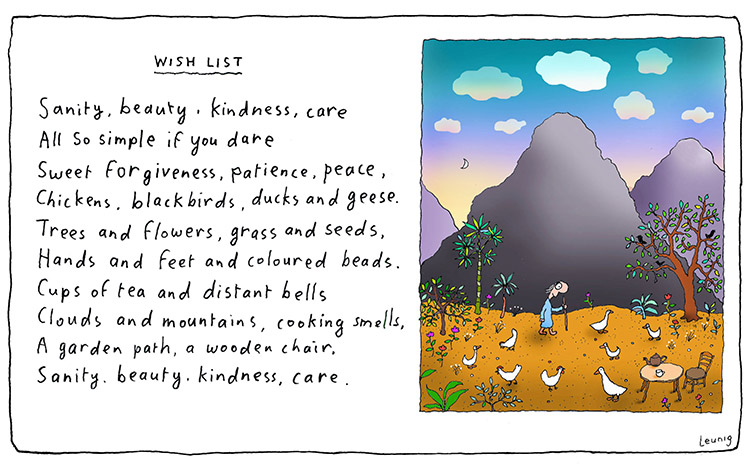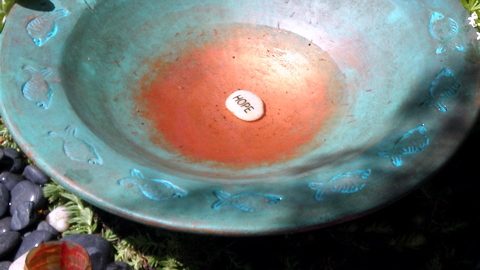One of the dilemmas we all face is that we don’t live up to our own standards and expectations. It is painful, once again, to see myself, make the same old mistakes, bite the hook, and succumb to righteousness, defensiveness, or something like, “mistakes were made but not by me.”
In Living Fully with Illness, we speak of the naturalness of death, much like tornadoes, hurricanes and so on. I view our frailties and our failings, with that same understanding. We are humans, not robots.
Therefore, when we make mistakes, or break our vows, it is not helpful to be against ourselves. If we can learn to just step back and bring a quality of impartial self-awareness, we can notice what happened and see if we can do better the next time. Furthermore, we can bring that same quality to our judgment of others. We recognize that we are all humans, in the same boat, and our job is to help each other keep the boat afloat and moving forward.
I love how Pema Chodron describes our human dilemmas.
She sees them as an opportunity to cultivate loving-kindness and compassion. This is what she says:
“be patient with the fact that you’re human and that you make these mistakes. That’s more important than getting it right.”
How about that! Of all the articles that Pema has written this one has been the most helpful to me and I hope you find it useful too. Here is an excerpt:
Oops, I did it again
“I’d like to stress that one of the things you most have to be patient with is, ‘Oops, I did it again!’ There’s a slogan that says, ‘One at the beginning and one at the end.’ That means that when you wake up in the morning you make your resolve, and at the end of the day you review, with a caring and gentle attitude, how you have done. Our normal resolve is to say something like, ‘I am going to be patient today,’ or some other such set-up (as someone put it, we plan our next failure).
Instead of setting yourself up, you can say, ‘Today, I’m going to try to the best of my ability to be patient.’ And then in the evening you can look back over the whole day with loving-kindness and not beat yourself up. Your patient with the fact that when you review your day, or even the last forty minutes, you discover, ‘I’ve talked and filled up all the space, just like I’ve done all my life, as long as I can remember. I was aggressive with the same style of aggression that I’ve used as long as I can remember. I got carried away with irritation exactly the same way that I have for the last…’ If you’re twenty years old, it’s been twenty years that you’ve been doing it that way; if you’re seventy-five years old, it’s seventy-five years that you’ve been doing it that way. You see this and you say, ‘Give me a break!’
You are Human
The path of developing loving-kindness and compassion is to be patient with the fact that you’re human and that you make these mistakes. That’s more important than getting it right. It seems to work only if you’re aspiring to give yourself a break, to lighten up, as you practice developing patience and other qualities such as generosity, discipline and insight. As with the rest of the teachings, you can’t win, and you can’t lose. You don’t get to just say, ‘Well, since I am never able to do it, I’m not going to try.’ You are never able to do it and still you try.
And, interestingly enough, that adds up to something; it adds up to loving-kindness for yourself and for others. You look out your eyes and you see yourself wherever you go. You see all these people who are losing it, just like you do. Then, you see all these people who catch themselves and give you the gift of fearlessness. You say, ‘Oh wow, what a brave one—he or she caught themselves.’ You begin to appreciate even the slightest gesture of bravery on the part of others because you know it’s not easy, and that inspires you tremendously. That’s how we can really help each other.” (this excerpt is from the article in Lion’s Roar called The Answer to Anger & Aggression is Patience by Pema Chodron)
In these days it can be easy to wake up grumpy. Many are suffering physical and mental distress. The last thing we need to do is “throw sticks at our own heart,” as Hafiz says.
Let’s do our best, and at the end of each day, put the rest aside. We can never go wrong with gentleness and kindness. Each day is a brand new 24 hours. Let’s always start fresh and work with that.
“Seven times down, eight times up.” Dr Shoma Morita
I wish you an armload of joyful moments. Hope to see some of you at the Coffee house this week. Warmly, Trudy














Comments are closed.
The phrase “I’m going to try…” is surprising. I’ve always thought that “trying” can be a lack of commitment or implies behavior contingent on feelings.
Yoda said, “Do or do not. There is no try.”
Fritz Perls said, “Trying is lying.”
Hi Carl: Thanks for bringing this up. I love Yoda too and have also used his words. However, I see the possibilities for both pieces of advice. When it comes to cultivating a certain quality, my experience aligns with Pema Chodron’s words, ”I’m going to try to the best of my ability to be patient.” I respond to that approach. Speaking as an “oops” person I see this not as a cop out or being feeling driven but simply as being realistic. The wonderful thing about having so many great teachers is that each of us finds support that can be helpful to us. There is no one formula, don’t you think. When it comes to keeping an appointment I don’t need to try. You can count on me being there. I am very appreciative that you took the time to read and to comment. Best wishes, Trudy